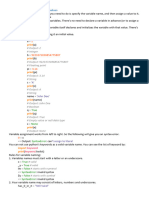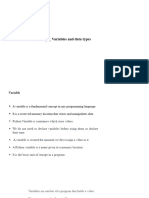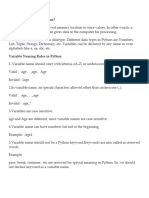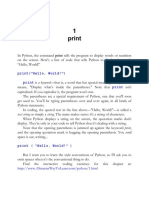0% found this document useful (0 votes)
8 views2 pagesPython Notes by Rishabh Mishra-Chap04-Variables
This document is a tutorial on variables in Python, explaining that a variable is a symbolic name referencing an object and can hold different data values. It provides examples of variable assignments and naming conventions, including rules such as starting with a letter or underscore and being case-sensitive. Additionally, it highlights the importance of not using reserved keywords for variable names.
Uploaded by
akrajcsCopyright
© © All Rights Reserved
We take content rights seriously. If you suspect this is your content, claim it here.
Available Formats
Download as PDF, TXT or read online on Scribd
0% found this document useful (0 votes)
8 views2 pagesPython Notes by Rishabh Mishra-Chap04-Variables
This document is a tutorial on variables in Python, explaining that a variable is a symbolic name referencing an object and can hold different data values. It provides examples of variable assignments and naming conventions, including rules such as starting with a letter or underscore and being case-sensitive. Additionally, it highlights the importance of not using reserved keywords for variable names.
Uploaded by
akrajcsCopyright
© © All Rights Reserved
We take content rights seriously. If you suspect this is your content, claim it here.
Available Formats
Download as PDF, TXT or read online on Scribd
/ 2


























































